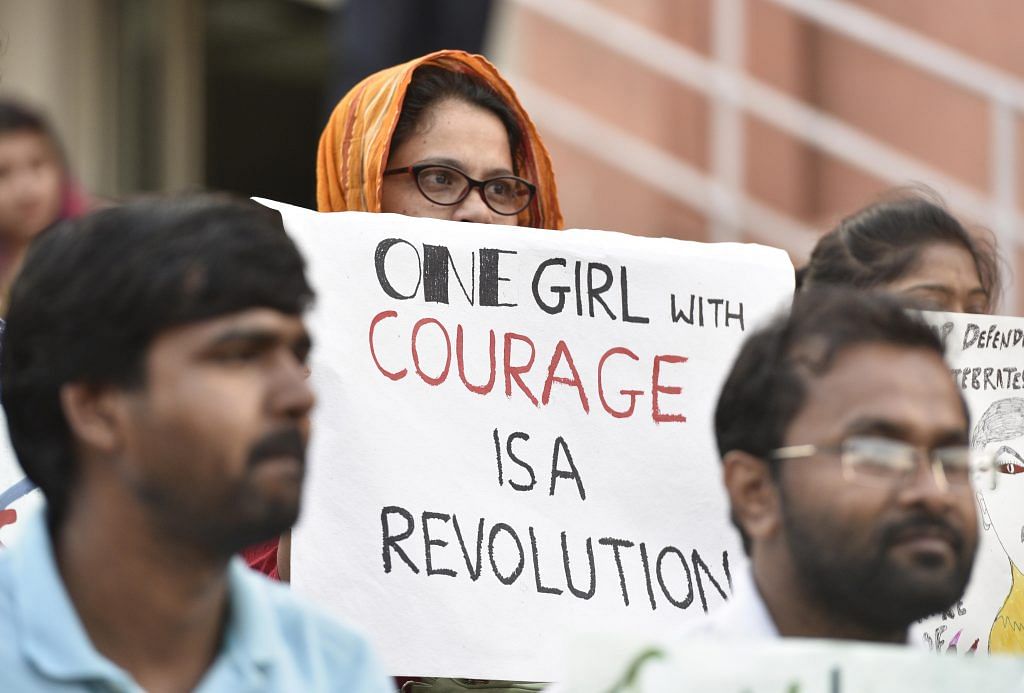A few female journalists and politicians have vehemently opposed and openly criticised the stories narrated by women as part of the #MeToo movement.
New Delhi: In the wake of the second wave of the #MeToo movement in India, alleged perpetrators have come out with defences, filing defamation cases and blaming the victims. From M.J. Akbar to Alok Nath, all have mocked the voice of dissent raised by women about sexual harassment in the workplace.
On social media, a string of users, predominantly male and Right-wing, have backed the alleged perpetrators. They have generated a hashtag, #fakemetoo.
Also read: Priya Ramani vs MJ Akbar must not stop public naming & shaming in India’s #Metoo
Alongside these individuals, a few female journalists and politicians too have vehemently opposed and openly criticised the stories narrated by women.
They stand in stark contrast to women like actor-filmmaker Nandita Das, who has extended unabashed support to the movement despite her father, artist Jatin Das, being accused.
Tavleen Singh
Senior journalist Tavleen Singh wrote an article denouncing #MeToo as an imitation of its counterpart in the West. She pointed out the movement’s irrelevance and jumped in defence of her “friend” Suhel Seth, who has been accused by multiple women, including minors.
Singh went on to support Akbar by urging everyone to respect him as “an editor with an immense contribution to journalism”.
By the standards of MeToo we will have to stop reading Hemingway, Ghalib, Faiz and Manto. MJ Akbar is flawed. But should we remember him as a sexual predator or an editor with an immense contribution to journalism.
— Tavleen Singh (@tavleen_singh) October 16, 2018
The argument generally put forth by the individuals denouncing the movement is that the victims are wrongly seeking a social media trial and not going to the courts. They also criticise the elitist nature of the movement, which largely seems to undermine the plight of marginalised women who are raped and tortured every other day.
Elaborating on this, Singh cited several examples in her article, including honour killings in Bihar and Rajasthan, which she said were conveniently ignored by #MeToo activists.
Seema Mustafa
Mustafa, editor-in-chief of The Citizen, wrote an article, which was updated after Ghazala Wahab made accusatory revelations about Akbar.
She defined the “fine line” between a sexual offender and a man who invites a female colleague for a drink. Her problem with the movement, she indicated, was that it holds both guilty of sexual harassment.
Like Singh, she further went on to highlight the elitist nature of the movement. She pointed out the “backwaters of Hindi belt” where women are repeatedly pulled down by patriarchy. #MeToo fails to go beyond the confines of the urban middle class with an access to social media.
In her latest editorial in The Citizen, Mustafa chalked out instances where she could have been or was closely harassed. Titled, ‘Traumatised By a Silly, Vain Man? No Way!’, the article arrives at the conclusion that fear is one’s greatest enemy and women need not be scared of the perpetrators.
Manjula Narayan
Narayan, a senior journalist with Hindustan Times, took to Twitter to criticise #MeToo. She sarcastically tweeted that if enough people insinuate something, it becomes the truth.
The MeToo campaign in India at least is like The Scarlet Letter meets The Crucible. If enough people insinuate something it miraculously becomes the Truth. And dare I say it? There’s something fully fundamentalist abt it too ?
— manjula narayan (@utterflea) October 12, 2018
She vehemently rejected the charges against actor Rajat Kapoor because he is a “good friend” of hers. According to her, #MeToo is merely a movement to pull down reputed personalities.
Narayan’s husband C.P. Surendran is also among those accused.
Usha Thakur
A BJP MLA from Madhya Pradesh, Usha Thakur said she found no point in bringing up these age-old cases of harassment on social media now. She also dismissed the movement as a “shortcut to success”.
Women seeking personal gains or promotions were using the movement in their own favour, she felt.
Also read: Wish #MeToo had started sooner, says judge who accused retired HC justice of harassment
Speaking about the demands for Akbar’s resignation (she spoke before he resigned as Union Minister of State for External Affairs Wednesday), she firmly said there should be an effort to save the failing moral values of the society. She also claimed that there was no reason for Akbar to resign.
Catch ThePrint’s in-depth, extensive coverage of the #MeToo movement in India here
